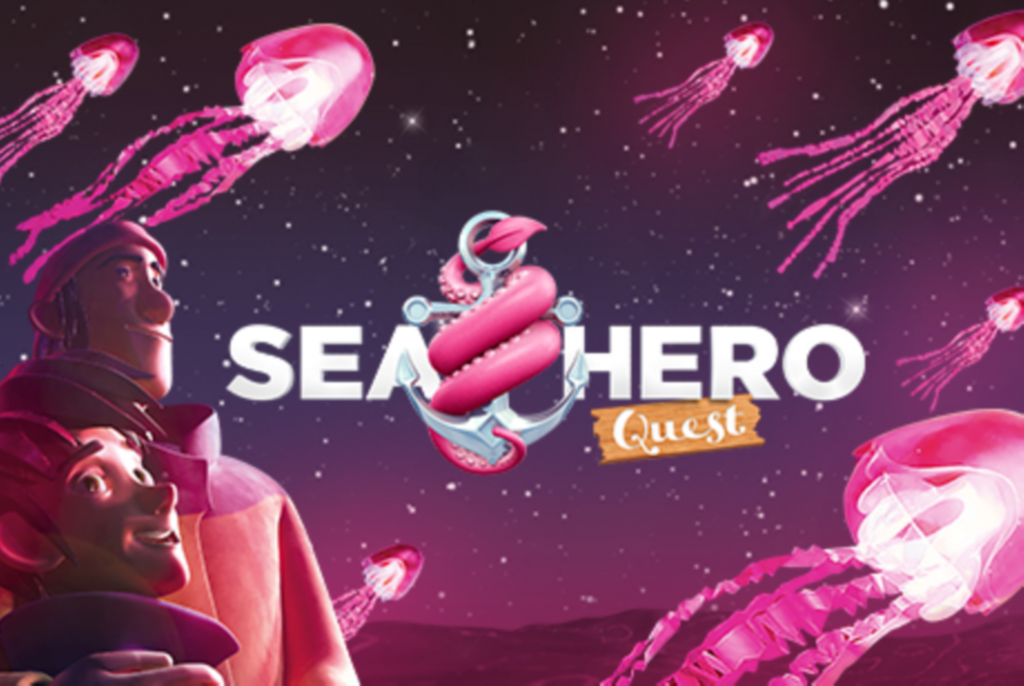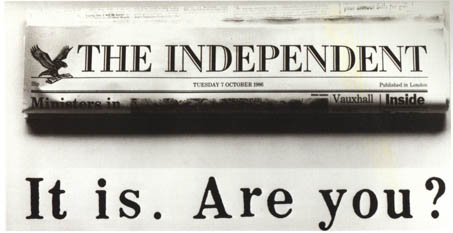Advertising needs more chutzpah

At the end of last year I wrote a piece celebrating 50 years of Saatchi & Saatchi.
We aren’t much given to looking backwards as an agency but I wanted to talk about the value of audacity in making the work that makes a difference. And illustrate this with my personal favourites from the Saatchi & Saatchi back catalogue. Because we could all do with a bit of chutzpah in our lives this year.
Originally a Yiddish word, chutzpah means the quality of audacity.
Nothing really describes the magic that has guided Saatchi & Saatchi over the last 50 years better than chutzpah. So much so that when former Global Creative Director Richard Myers wrote the agency’s inside story in 2017 he called it Chutzpah & Chutzpah.
As people, as agencies and as an industry we are at our best when we are brimming with self-confidence, when we back our conviction with courage, when what we pull off takes a certain amount of nerve. That’s when the good stuff happens. And this takes chutzpah, in conception and execution.
BT teaching the nation essential tech skills every night in lockdown, ITV standing up to the racists in its audience, Burger King showing off its rotten burgers. It’s all built on chutzpah.
And right now the industry, squaring up to the task of putting our economy back on its feet, could perhaps use some inspiration from the home of chutzpah.

The Independent, It is, are you? – 1986
It is, are you? remains the most famous newspaper campaign of all time after The Guardian’s Point of View. Responsible, not just for the paper’s launch but also for its name, that was to have been The Meridian until an odd line at the bottom a trade ad about the paper’s target audience changed history.
But the work isn’t really the story. At the time Saatchi & Saatchi launched The Independent, The Times and Sunday Times, both of which were impacted by the success of the upstart paper, were amongst the agency’s larger clients. This inconvenient truth was squared away with an extraordinary act of account management and 35 years on it’s the Independent’s work we remember not that for the Times.
Chutzpah isn’t just a creative superpower it’s the essence of great account handling.
BA, Face – 1989
The genesis of BA Face is the stuff of legend. Scribbled down by Graham Fink and Jeremy Clarke after thirty other scripts had been rejected, the idea came to the team almost fully formed and in a matter of minutes. Sold from hastily created scamps and beautiful in its simplicity and power, the question was always whether it could be made at all. The idea seemed impossible to realise but that wasn’t going to stop Fink and Clarke.
It needed a director brave enough to take it on and film the whole thing in camera, so they enrolled Hugh Hudson. It needed hundreds of extras clad in patriotic colours and artfully arranged into different formations, so they tracked down the choreographer for the Atlanta Olympics. And it needed music that was both classic and contemporary so they tapped up Malcolm McLaren. Fink and Clarke pulled the idea out of thin air and then the production out of nowhere.
Chutzpah means knowing if you can think it, you will find a way to do it.
Carlsberg, Old Lions – 2006
Carlsberg made the best lager in the world, probably. So the idea was always that if they turned their hands to other stuff they would be pretty good at that too. Like pub football teams.
And so to support England’s 2006 World Cup run, Carlsberg put together the greatest English pub football team. The crowning glory would be seeing football legends Jackie and Bobby Charlton on the pitch together once more. The trouble was that anyone with an ounce of football knowledge knew that the rift between the Charltons was, and remains, one of the most bitter feuds in the history of the game. Fortunately, Saatchi’s casting director Linda Beatty knew absolutely nothing about football and proceeded to book them anyway, going as far as putting them up in the same hotel. That the Charltons didn’t walk out on the day took the extraordinary skills of Chris Palmer.
Sometimes true chutzpah is born of absolute naivity.
T-Mobile, Liverpool Street Dance – 2009
Dance was created to bring T-Mobile’s ‘life’s for sharing’ idea to life and for real. Really real mind, not faked real. Really real meant taking over Britain’s third busiest railway station at rush hour and using eleven cameras to shoot a carefully choreographed and secretly rehearsed dance, in front of bemused and surprised commuters.
But really real also meant in real time. For the idea to work and to be shared, people needed to witness the event live one morning, hear about it in the news that evening, see it in the Nationals the next day and watch it on TV just over 24 hours later. That meant filling an ad break take-over with a commercial that didn’t exist the morning before it aired and for that took the sheer nerve of Channel 4 complete collaboration from Clearcast.
Chutzpah is infectious, it brings out support from the least likely places.
Direct Line, The Fixer – 2014
It was always insane. To press a gangland fixer into service as the spokesperson for an insurance company in the form of Pulp Fiction’s Winston Wolfe. In truth one of the most commercially successful ad campaigns of the last decade really shouldn’t have made it to the screen at all.
Logically, the research should have stopped it (this is literally what people think about insurance). The client should have stopped it (it’s high cost and high risk). Hell, at least Quentin Tarantino should have stopped it (he is not given to using his work in advertising). The obstacles to this idea seeing the light of day were endless, including a CEO that suggested the client pull the whole project days before play out. Each call would have made sense and each call would have denied Direct Line the injection of energy and creativity that have transformed the brand’s fortunes.
Chutzpah may start in the agency but it’s not our exclusive preserve, this was a client brimming with the self-same quality.
Deutsche Telekom, Sea Hero Quest – 2017
The idea had been to see whether the millions of hours and vast vats of data devoted to mobile gaming could be harnessed for good. Pretty straightforward. But the audacity of suggesting it try and solve a vital medical problem that no one else had tackled is still breath taking.
Sitting in University College London was a scientist that had been using driving games to understand how people navigate in order to see if you could diagnose early signs of dementia. What he lacked was enough data to establish benchmark behaviour. The endeavour was going to take years until some ad people rocked up and suggested designing a mobile game that millions of people might play and that feed data back to his scientists. The result was Sea Hero Quest, played by nearly three million people, contributing over eleven thousand years of lab equivalent data and revolutionising dementia research.
Chutzpah sells but it is also something the world needs from the industry, helping us solve problems where caution, logic and common sense sometimes fail.
So here’s to chutzpah that works its magic in in all of us that love this business. That breeds and provokes the audacity to transform our clients’ businesses and change the world around us.
And here’s to 50 years of Chutzpah & Chutzpah.
Discover more from
Subscribe to get the latest posts sent to your email.
